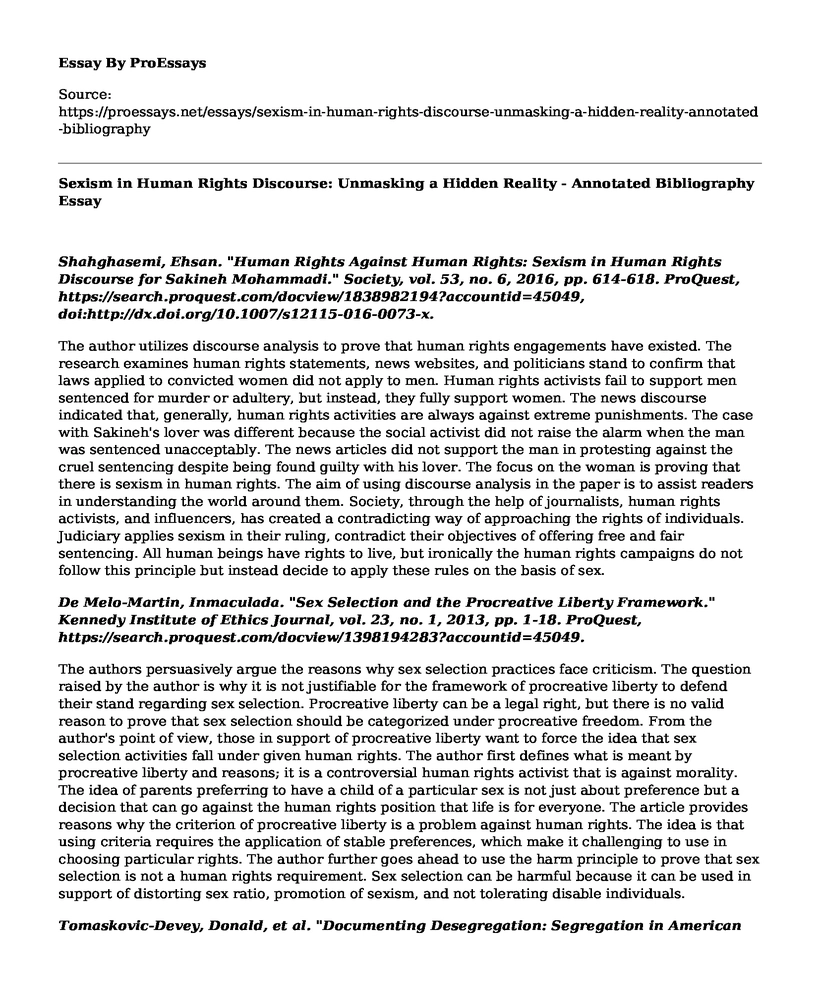Shahghasemi, Ehsan. "Human Rights Against Human Rights: Sexism in Human Rights Discourse for Sakineh Mohammadi." Society, vol. 53, no. 6, 2016, pp. 614-618. ProQuest, https://search.proquest.com/docview/1838982194?accountid=45049, doi:http://dx.doi.org/10.1007/s12115-016-0073-x.
The author utilizes discourse analysis to prove that human rights engagements have existed. The research examines human rights statements, news websites, and politicians stand to confirm that laws applied to convicted women did not apply to men. Human rights activists fail to support men sentenced for murder or adultery, but instead, they fully support women. The news discourse indicated that, generally, human rights activities are always against extreme punishments. The case with Sakineh's lover was different because the social activist did not raise the alarm when the man was sentenced unacceptably. The news articles did not support the man in protesting against the cruel sentencing despite being found guilty with his lover. The focus on the woman is proving that there is sexism in human rights. The aim of using discourse analysis in the paper is to assist readers in understanding the world around them. Society, through the help of journalists, human rights activists, and influencers, has created a contradicting way of approaching the rights of individuals. Judiciary applies sexism in their ruling, contradict their objectives of offering free and fair sentencing. All human beings have rights to live, but ironically the human rights campaigns do not follow this principle but instead decide to apply these rules on the basis of sex.
De Melo-Martin, Inmaculada. "Sex Selection and the Procreative Liberty Framework." Kennedy Institute of Ethics Journal, vol. 23, no. 1, 2013, pp. 1-18. ProQuest, https://search.proquest.com/docview/1398194283?accountid=45049.
The authors persuasively argue the reasons why sex selection practices face criticism. The question raised by the author is why it is not justifiable for the framework of procreative liberty to defend their stand regarding sex selection. Procreative liberty can be a legal right, but there is no valid reason to prove that sex selection should be categorized under procreative freedom. From the author's point of view, those in support of procreative liberty want to force the idea that sex selection activities fall under given human rights. The author first defines what is meant by procreative liberty and reasons; it is a controversial human rights activist that is against morality. The idea of parents preferring to have a child of a particular sex is not just about preference but a decision that can go against the human rights position that life is for everyone. The article provides reasons why the criterion of procreative liberty is a problem against human rights. The idea is that using criteria requires the application of stable preferences, which make it challenging to use in choosing particular rights. The author further goes ahead to use the harm principle to prove that sex selection is not a human rights requirement. Sex selection can be harmful because it can be used in support of distorting sex ratio, promotion of sexism, and not tolerating disable individuals.
Tomaskovic-Devey, Donald, et al. "Documenting Desegregation: Segregation in American Workplaces by Race, Ethnicity, and Sex, 1966-2003." American Sociological Review, vol. 71, no. 4, 2006, pp. 565-588. ProQuest, https://search.proquest.com/docview/218830374?accountid=45049.
The objective of the author is to document desegregation in American workplaces based on race, ethnicity, and sex. The documentation is between 1966 and 2003. First, the author provides an overview of trends regarding occupational segregation. The paper uses descriptive analysis to pass information in the article. Literature reviews are used by the author to point out changes in sex segregation in the USA. The research further provides the strengths and limitations of data used in documenting discrimination. The segregation model used in the study indicates that workplaces with lower measured segregation are characterized by a well mapped out occupational divisions. Evidence from state estimation using regression analysis shows that manufacturing sectors reported high cases of desegregation in the US. The purpose of the author is to prove that data on desegregation at the workplace was misleading. The outcome of the research, however, indicates that there has been a reduction of segregation cases in workplaces. The decrease is attributed to increased human rights campaigns over the years.
Works Cited
De Melo-Martin, Inmaculada. "Sex Selection and the Procreative Liberty Framework." Kennedy Institute of Ethics Journal, vol. 23, no. 1, 2013, pp. 1-18. ProQuest, https://search.proquest.com/docview/1398194283?accountid=45049
Shahghasemi, Ehsan. "Human Rights Against Human Rights: Sexism in Human Rights Discourse for Sakineh Mohammadi." Society, vol. 53, no. 6, 2016, pp. 614-618. ProQuest, https://search.proquest.com/docview/1838982194?accountid=45049, doi:http://dx.doi.org/10.1007/s12115-016-0073-x.
Tomaskovic-Devey, Donald, et al. "Documenting Desegregation: Segregation in American Workplaces by Race, Ethnicity, and Sex, 1966-2003." American Sociological Review, vol. 71, no. 4, 2006, pp. 565-588. ProQuest, https://search.proquest.com/docview/218830374?accountid=45049
Cite this page
Sexism in Human Rights Discourse: Unmasking a Hidden Reality - Annotated Bibliography. (2023, Mar 04). Retrieved from https://proessays.net/essays/sexism-in-human-rights-discourse-unmasking-a-hidden-reality-annotated-bibliography
If you are the original author of this essay and no longer wish to have it published on the ProEssays website, please click below to request its removal:
- Presentation on Bullying in Schools
- Violence Against Women and Girls - Sociology Essay Example
- Research Paper on Gender Equality: Women Still Do Not Have Equal Rights as Men
- Essay Sample on Racial Profiling, Racism, and Discrimination Continues in America
- Essay Sample on Being Antiracist: Uncovering the History of Racialization
- Paper Example on US Drone Strikes: Targeting Terrorists Beyond War Zones
- Paper Sample on Racism in Advertising: A Global Challenge Affecting Business







